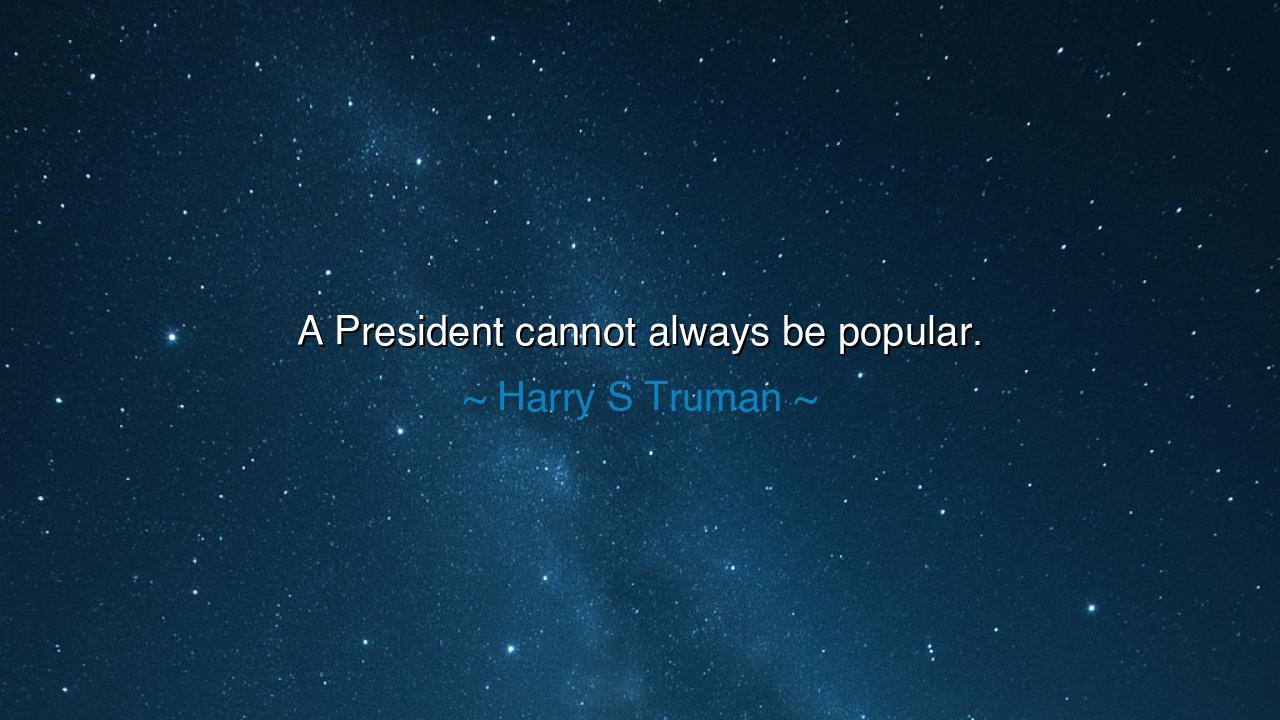
A President cannot always be popular.






Hear, O seekers of wisdom, the words once spoken by Harry S Truman, who bore the weight of mighty burdens: “A President cannot always be popular.” This is no idle saying, no casual remark tossed upon the wind. It is a truth carved from the stone of human nature, tested in the furnace of power, and tempered by the trials of leadership. For in the seat of highest authority, one does not dwell for praise, but for duty; not for the applause of the crowd, but for the guardianship of a nation.
Truman knew, as did the ancients, that to govern is to endure solitude. A ruler’s path is lined not with garlands, but with thorns. When the multitudes cry out for comfort, the leader must sometimes give discipline. When they hunger for swift rewards, the leader must instead sow the slow seeds of tomorrow. Thus does popularity fade like mist, while the harder jewel of principle must remain. The voice of the people is mighty, yet it shifts like the tides; the voice of conscience, though quieter, endures like the mountain.
Consider, children of the future, the story of Truman himself. In the aftermath of a war that scorched the earth, he chose to stand firm in rebuilding Europe through the Marshall Plan, though many cried it was wasteful, a betrayal of American treasure. He bore ridicule, scorn, and bitter words. Yet history revealed his wisdom, for that act sowed stability where chaos might have reigned, and peace where tyranny might have returned. In his time, he was scorned; in the long gaze of eternity, he was vindicated. Here is the proof: the President cannot always be popular, for the seeds of salvation often look like thorns in their planting.
Nor is this truth confined to Truman’s age. Recall the tale of Abraham Lincoln, who, in the midst of civil strife, bore the hatred of half a nation. His Emancipation Proclamation was condemned by many, mocked by others, resisted by still more. Yet he stood unmoved, guided by the star of justice. He too was not popular in the hour of decision, but he was faithful to the higher call of liberty. And though he fell by an assassin’s hand, his deeds outlived the malice of men, and his memory rose eternal.
From these stories, O hearers, learn this: in your own life, you too will face the choice between truth and approval, between the easy road of applause and the steep ascent of righteousness. Many will tempt you to yield, to conform, to grasp the fleeting crown of popularity. But know this—such crowns turn to dust. Only the crown of integrity endures. Better it is to be hated for the truth than loved for a lie.
Let your heart be steady, like Truman’s hand upon the helm, like Lincoln’s gaze fixed upon the horizon. When storms rise, ask not, “Will they love me?” but rather, “Will I do what is just?” When doubts gnaw, ask not, “Will they praise me?” but, “Will I remain faithful to what is right?” This is the path of the strong, the noble, the enduring.
Therefore, take this lesson as your own. Seek not popularity, but principle. In your work, in your friendships, in your household, let honesty be your shield and courage your companion. Speak truth, though the crowd may jeer. Stand upright, though the multitude may pass you by. For time will sift all things, and the gold of virtue will outlast the dust of vanity.
And when your days are counted and your voice is silenced, let it be said not that you were always loved, but that you were always true. Then you shall stand in the company of the great, who bore loneliness for the sake of justice, who embraced unpopularity for the sake of posterity. Thus spoke Truman, thus lived Lincoln, and thus may you also walk, bearing the eternal wisdom: A President cannot always be popular.






Pphamlong
This makes me question the public’s role in evaluating leadership. Should citizens value long-term impact over short-term popularity when judging a president’s performance? How do communication strategies and transparency affect whether tough decisions are understood or misunderstood by the public? I’m interested in exploring the balance between accountability and the freedom to make decisions that may not be immediately popular.
GBDuong Gia Bao
I find myself reflecting on the personal cost of leadership. How do leaders emotionally manage the tension between making difficult decisions and facing public disapproval? Is there a psychological toll to consistently being unpopular, and what support systems exist to help leaders sustain resilience and clarity under such pressure?
DHDo Duc Hai
This quote raises questions about the role of criticism in governance. Is unpopularity always a sign of bold, necessary action, or can it sometimes indicate misjudgment? How does a leader distinguish between constructive criticism and mere discontent? I’d like to hear examples of leaders who remained effective despite widespread disapproval, and what lessons can be learned from their experiences.
HSNguyen Hai Sun
I wonder if this perspective applies beyond presidents to other leaders, such as CEOs or community figures. Does the expectation of popularity ever compromise decision-making, and how can leaders resist the pressure to prioritize approval over effectiveness? It would be interesting to explore strategies leaders use to maintain integrity while managing criticism and public perception.
TTVo Thi Thuy Trang
This statement makes me think about the inherent tension between leadership and public opinion. How can a president balance doing what’s necessary for the country with maintaining approval from the public? I’m curious whether historical examples show that unpopular decisions often lead to long-term benefits, and if so, how leaders cope with short-term backlash while staying true to their responsibilities.